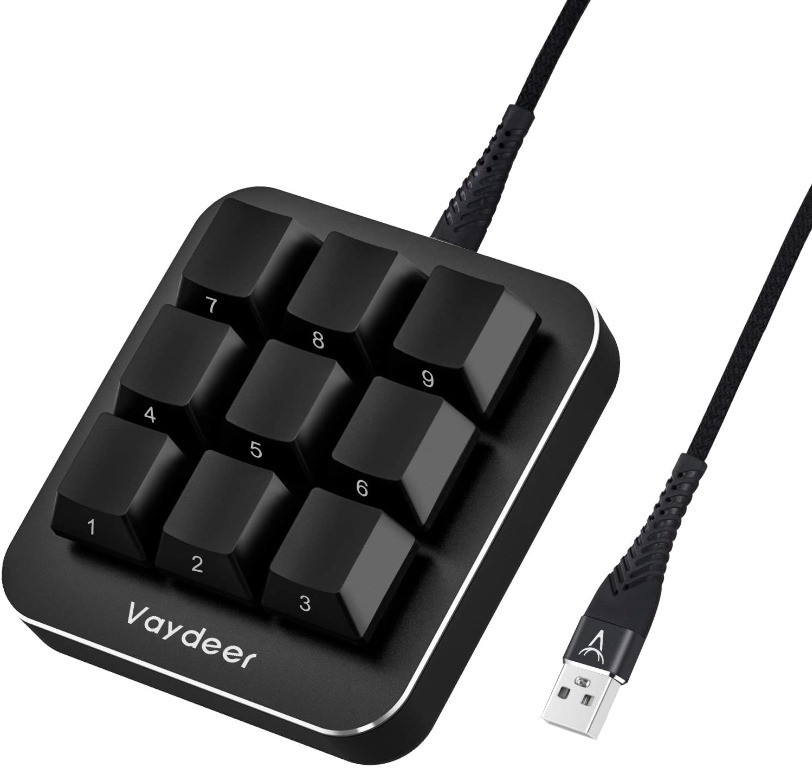 A generic picture of the 9 key. You can pick it up on their
website
should you feel like having one too.
A generic picture of the 9 key. You can pick it up on their
website
should you feel like having one too.My previous job was work from home and had a yearly home stipend to purchase things to make our home offices more efficient. Employees could use this for things like a new office chair, headphones, ring lights, plants, etc. Things that you'd find in a real office that aren't managed by IT per-se. One of the things I picked up was a little 9-key keyboard from a company called vaydeer. It's a tiny mechanical keyboard with MX stems and an ESP32 brain. The software provided worked fine for my work macbook and my main Windows PC. You could configure it to hit media keys, combinations (usful for Zoom or teams) and even full chain macros with timings. You don't need the software to run the macros either, they're all stored on the ESP32 after you do the configuration.
 A generic picture of the 9 key. You can pick it up on their
website
should you feel like having one too.
A generic picture of the 9 key. You can pick it up on their
website
should you feel like having one too.
While the keyboard itself stores the macros and Windows and macOS don't require
software to actually be installed for the keyboard to work, it doesn't show up
as a normal keyboard either. Due to this it does not work in Linux. It will
show up in lsusb as ID 0483:5752 STMicroelectronics USB2.0 HUB but none of the
key presses actually register. For a long time this wasn't really an issue, but
for the past year my current job (also remote) has us running Ubuntu, and it
has been a bit annoying not having my volume, mic mute, and video enable buttons
available on my desk. I decided to look into this and it seems I'm not the only
one who has these issues either. Thankfully there is a solution.
For some reason, listening to the hidraw file directly activates the keyboard in Linux. This is a weird fix but someone figured it out.
To make the keyboard work, the following script can be used (run as root)
#!/bin/bash
FILES=/dev/hidraw*
for f in $FILES
do
FILE=${f##*/}
DEVICE="$(cat /sys/class/hidraw/${FILE}/device/uevent | grep HID_NAME | cut -d '=' -f2)"
if [ "$DEVICE" == "Vaydeer 9-key Smart Keypad" ]
then
printf "%s \t %s\n" $FILE "$DEVICE"
cat /dev/${FILE} > /dev/null &
fi
doneI named this file /usr/bin/vaydeer and chmod'd a+x. Running sudo vaydeer in
terminal immediately makes the keyboard usable in Linux. Yay!
We can go one step further and create a udev rule that runs that script whenever
the keyboard is detected by the kernel. It's a simple one line rule that should
go in /etc/udev/rules.d I named mine 82-vaydeer.rules. The number is
slightly arbitary, the kernel always runs lower numbered rules first though, so
keep that in mind.
The file contains the following:
#
# Run the vaydeer hack script to get it working again
#
ACTION=="add", SUBSYSTEM=="usb", ATTR{idVendor}=="0483", ATTR{idProduct}=="5752", RUN+="/usr/bin/vaydeer"That's it, Whenever the vendor:product ID filter from lsusb is matched, run the script we created. Now whenever you plug in the 9-key (or switch your KVM input back to your linux machine) it will automatically work the way it's supposed to, just like it does in Windows and macOS.
🏷 Linux
🏷 Hardware